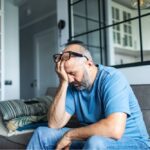Depression is a mental health disorder that causes a person to feel isolated, fatigued, constantly sad, and unable to see the good in life. For many people, depression can be brought on by trauma, genetics, or as a side-effect of medications. If you’re depressed, it’s not possible to just “be happy,” even if you’re surrounded by positive people and experiences.
For some, substances like alcohol or stimulants may be a tool for self-medication against depression. You may develop a substance use disorder (SUD) because you’re using these drugs as a way to help yourself deal with your depression symptoms.
- If you don’t have a drink, you cannot make it through the day.
- You need to use stimulant drugs just to deal with the work you have to do.
- You drink so you don’t have to think.
When you are facing both SUD and mental health disorders, you’re experiencing co-occurring disorders, and both conditions must receive treatment at the same time for you to find your way ahead. It’s estimated that 9.2 million people in the U.S. have co-occurring disorders, according to the Substance Abuse and Mental Health Services Administration.
How Do You Know You Have Depression?
Either depression or SUD can occur first and lead to the other. Let’s start with depression. If you have any of the signs of depression listed here, that could mean your brain isn’t processing information properly, or hormone imbalances may be occurring.
- Persistently sad, even when you don’t know why you are sad
- Feeling empty or simply going through the motions of the day
- Experiencing feelings of guilt and worthlessness
- No longer enjoying things you used to, like activities, people, or hobbies
- Feeling irritable or experiencing mood swings
- Experiencing a feeling of hopelessness
- Having difficulty concentrating
Depression doesn’t always mean a person is crying all of the time or lying on the couch streaming TV. Rather, it may lead to a lack of concentration, apathy, anxiety, a lack of appetite (or overeating), and trouble sleeping.
How Can Depression Lead to SUD?
If you’re experiencing any of these signs of depression, your brain naturally wants to find a way to fix it. The brain is structured to seek out things that bring us joy and happiness. Sometimes, when these things cannot be found in everyday life, people start to seek out substances like alcohol, opiates, or benzodiazepines. These drugs, though, can oftentimes worsen your depressive symptoms. They make you feel a bit less intense at the moment, but you’ll likely feel the depression coming back soon.
Others seek out drugs that make the brain and body work harder by stimulating the function of the central nervous system. When using drugs like amphetamines and cocaine, the signs of depression may temporarily fade away.
What Do You Do If You’re Depressed and Have an Addiction?
Co-occurring disorder treatment is one of the most effective strategies available for treating both mental health and substance use disorders. Treatment helps your brain reduce its dependence on substances while also working to treat the underlying mental health concern.
If you have signs of depression and you’re using substances as a coping mechanism, your treatment may include:
- Behavior therapies that help to improve your ability to cope with the world around you
- Strategies that help you see what’s really present in your day-to-day life and change negative thoughts
- Medications to treat hormone imbalances that may be causing the depression
- Holistic therapy to help heal your mind and body
- Motivational incentives and contingency management strategies
What is most important is having a strategy for addressing the underlying cause of the complications, such as stress management improvement or managing past trauma that could be limiting your success. Other times, depression is very much a hormonal concern that requires medication to help your body and brain work together. Your therapist and medical team will work to find the balance to help you recover fully.
Treating both conditions at once allows you to get the care and support you need to not just stop using drugs but also to find yourself empowered to build a life that you love. Take a closer look at the way that you can pursue recovery by entering into a treatment center that offers help for depression and substance use disorder.





